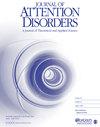研究认知脱离综合症与青少年解决社会问题的关系
IF 2.2
3区 医学
Q2 PSYCHIATRY
引用次数: 0
摘要
目的:认知脱离综合症(CDS)以前被称为认知节奏迟缓症(SCT),以过度做白日梦、精神错乱和活动不足等症状为特征。CDS 症状与情感、社交和日常生活障碍有关。一个人在日常生活中解决问题的方式与进一步遇到问题的经历有关,因此,适应不良的问题解决方式会导致进一步的身体和心理问题。然而,关于 CDS 症状如何与解决问题相关联的信息却很有限。本研究考察了CDS症状与不同社会问题解决方式的关系。方法:共有280名大学生(年龄18-23岁;77.9%为女性)完成了精神病理学症状和社会问题解决的测量。结果:除了多动症和内化症状之外,CDS症状还与适应不良问题解决的消极问题导向和回避风格领域独立相关。CDS症状可能会导致难以关注问题或难以通过相关步骤找出解决问题的方法,进而导致回避和社会退缩。需要进行纵向研究,以评估适应不良的问题解决方式作为 CDS、社交退缩和内化症状之间关联的潜在机制。本文章由计算机程序翻译,如有差异,请以英文原文为准。
Examining Cognitive Disengagement Syndrome in Relation to Social Problem Solving in Young Adults
Objective:Cognitive disengagement syndrome (CDS), previously referred to as sluggish cognitive tempo (SCT), is characterized by symptoms such as excessive daydreaming, mental confusion, and hypoactivity. CDS symptoms are associated with emotional, social, and daily life impairments. The way in which one solves problems in their daily life is associated with experiences of further problems, such that maladaptive problem-solving can lead to further physical and psychological problems. However, there is limited information on how CDS symptoms are associated with problem solving. The current study examined CDS symptoms in relation to different social problem solving approaches.Method:A total of 280 college students (ages 18–23 years; 77.9% female) completed measures of psychopathology symptoms and social problem solving.Results:Above and beyond ADHD and internalizing symptoms, CDS symptoms were independently associated with negative problem orientation and avoidance style domains of maladaptive problem solving.Conclusion:Findings indicate that CDS symptoms are related to specific difficulties with social problem solving. CDS symptoms may lead to difficulties attending to problems or working through relevant steps needed to identify solutions for the problem, which may then lead to avoidance and social withdrawal. Longitudinal research is needed to evaluate maladaptive problem solving as a potential mechanism in the association between CDS, social withdrawal, and internalizing symptoms.
求助全文
通过发布文献求助,成功后即可免费获取论文全文。
去求助
来源期刊

Journal of Attention Disorders
PSYCHIATRY-
CiteScore
7.60
自引率
6.70%
发文量
71
审稿时长
6-12 weeks
期刊介绍:
Journal of Attention Disorders (JAD) focuses on basic and applied science concerning attention and related functions in children, adolescents, and adults. JAD publishes articles on diagnosis, comorbidity, neuropsychological functioning, psychopharmacology, and psychosocial issues. The journal also addresses practice, policy, and theory, as well as review articles, commentaries, in-depth analyses, empirical research articles, and case presentations or program evaluations.
 求助内容:
求助内容: 应助结果提醒方式:
应助结果提醒方式:


